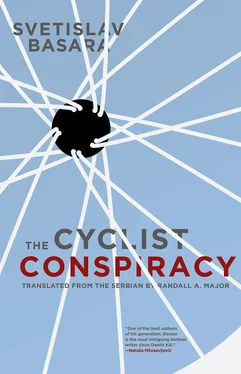The small-minded could accuse me of making literature hackneyed. However, that accusation means nothing to me, nor does any other except the most painful ones, originating in the conscious which, opposed to the psychoanalysts, I believe to be the voice of angels that reprimands us when we overdo it and turns us away from the ways of evil. No man would ever accuse himself, for the simple reason that it is difficult to compose an accusation that is horrible enough to cover the seriousness and quantity of the offenses. Without the courage to hear the voice of that angel and without that obedience, all other words are the rationalization of lawlessness, which is so remarkably seen in the empirical reality of the world. But, to obey the abovementioned voice is redemptive, even though it is not pleasant; in that way, we return to ourselves and to God, becoming the masters and not the slaves of reflection. The vast majority, still, depending on the subconscious and the dark urges that torment them, choose this or that way for speaking, for thinking, accompanied by a certain behavior like lichens on a tree, the entire panoptic of the mask. Still, all those battles for this thing or that, all those engagements and doctrines are just a human construction aimed at liberating a man from an unbearable nightmare — from himself. But that is where the cardinal error slips in. A person who frees himself from reflection is the only one to free himself at all.
I, of course, have not freed myself from reflection and thus I am partially free. That is not just rhetoric. Actually, the awareness of the impossibility of exiting from the magic circle of ideas, premises, and imagination is liberation and the surpassing of that awareness. As long as he is alive, a man is susceptible to constant attacks of spiritual filth and, if the mystics are to be believed, the same thing happens to them for a while even after death. To my way of thinking, not becoming tied down is important, the absence of the affects caused by thinking. In that sense, St. Paul says that “our struggle is not with the body, but with the spirits of darkness.” So, as time goes by, all my thoughts have a very limited duration. Even the speed with which I surpass my own opinions fills me with satisfaction. I was invited, I am recounting this as an example, to participate in a protest meeting against atomic energy and, believing that it was correct to get involved in the cause, I promised the organizers I would come. But I did not go. The night before the meeting, I realized that I do not have anything against atomic energy. That does not mean that I have become a supporter or that I have taken up the position of advocates of nuclear power stations: to change your mind does not mean to change your actions. Here it just meant that I was neither for nor against. How quickly things change in this world. One hundred years ago, the advocates of atomic energy, if there were any, had to be visionaries. A while later they became progressive thinkers and, practically, media stars, while today they are reactionaries and agents of international imperialism. Following that logic, and there is no evidence that it should not be followed, it can be expected that the members of the Green Party will become notorious reactionaries in a hundred years. One of the most repulsive things in history, which is full of disgusting things, is the excitement with which common sense accepts “progress,” against which the next generation is already protesting, completely in vain of course because, as one Buddhist teaching says — it is possible to avoid only a future evil. The evil spirit of Europe is certainly the constant, straining to rid itself of the evil that has passed, that has built itself into the present , so that only the phantoms of evil are persecuted in the past. To speak honestly, Europe has no future because it never had one and because it never cared about it, which is in opposition to Christ’s God-man, his eschatologically oriented mission and the final reality of a future that will not become the past.
Like always, whenever two Slavs start talking, we mentioned the unavoidable topics: Russia, Orthodoxy, Catholicism, Stalin… In terms of Russia, what can we say about it after Cioran’s ingenious study in the book you recently published in your “Alef” edition? And yet, I cannot resist writing a few comments about that terrific and terrifying country. The Russians are a people inclined to a heightened devotion to a way of thinking about which I spoke earlier, and also inclined to changes in their way of behaving . Someone once said, maybe Nabokov, that he could never get over the unmotivated changes in affect among the heroes of Dostoyevsky. To be perfectly honest, the Karmazov’s home can stand shoulder to shoulder with any insane asylum. The Karamazovs, though not crazy, are less stable personalities than the western clinical cases. This has its own arguments that cannot be proclaimed good or bad, but it cannot be denied that they are efficient and important not just for Russia. Only such a people is able to overthrow an empire and establish a communist regime overnight. Western Europe, where the idea of communism was conceived, was not able to do that nor will it ever be, because it is steeped in rationalism, and all the great shocks to the world — including Christianity as well — stand on irrational foundations. Pressed by the burden of civilization’s side of doctrine, and according to the Jewish logic that we give the best of ourselves when under pressure, Russia has the greatest chance to develop into the defender of Christianity; it is absurd, but absurd, especially for the Russians, does not mean impossible. The long-range character of the goals and acts is important; thinking is unimportant. Jesus is often contradictory in the Gospels; in one place he says one thing but something else in another, but he never even momentarily thinks of avoiding the cross. He was not interested in the world or the wisdom of the world; he was focused on the final things. The Russian people have always had great and far-reaching goals but, unfortunately, never great or far-reaching enough. And before now they have always led to one single wish: conquer the world, this one instead of the other one. And it seems that it is a historical necessity for Russia to conquer the world so that its unabashed pretensions will spread into the otherworld as well, into which they will step with the aid of the immeasurable repentance necessary to cancel out an equal amount of pride.
In terms of the nation to which we both belong, on the other hand, I almost do not know what to think about it. How can we explain to ourselves, and hardly to the world, our destiny, the Slavic Jews, scattered in the Diaspora almost purely because of our non-Jewish character, our disaccord, for which it is hard to find a comparison in history. Placed like a hernia between the West and East — I tend to suppose that our role as an adhesive is also our historical mission — we have never been and never will be people of the East or people of the West. That is, naturally, my completely subjective judgment based on our equal dislike of the East and West. But this vague animosity stops me from traveling in either of the two mentioned directions — I do not consider it in any way to be a defect. On the contrary, I consider it a virtue and completely agree with Hugh of St. Victor who says: “The man who finds his homeland sweet is still a tender beginner; he to whom every soil is as his native one is already strong; but he is perfect to whom the entire world is as a foreign land.” Christianity began with precisely that kind of conception of the world, and ended up in a national fragmentation such as history has never seen. We Serbs, in order to excel in rashness, we embraced an even more narrow vision of homeland: the locality where we were born, the street, the quarter, or the village. I have to admit that I myself (and not due to my own effort but by accident) liberated myself from that inhibiting loyalty with great difficulty. At that moment when I succeeded, without an intermediary state, the whole world became a foreign land to me, now I know, to my great fortune.
Читать дальше












